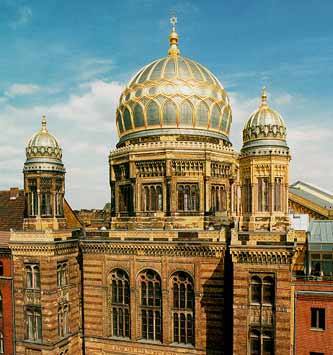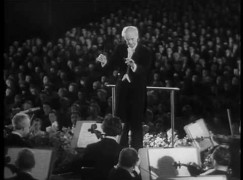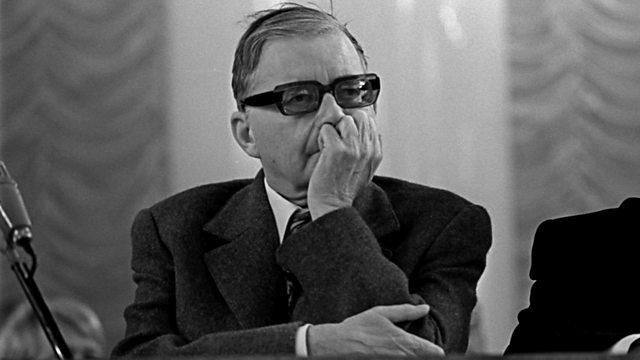DG’s first synagogue music release: hit or miss?
mainFrom the Lebrecht Album of the Week:
The appearance in Holocaust Memorial Week of an album of synagogue music on the Deutsche Grammophon label is a milestone of sorts, perhaps a first step towards a reckoning with the German company’s complicated past. Founded by Emile Berliner, an American Jew, DG was dominated in its heyday by an Austrian Nazi, Herbert von Karajan. One record of Jewish liturgies does not reconcile these extremes, but it does point towards a settling of memories.
The album’s content is archaic. The opening of the 3,000-seat Oranienburger Strasse synagogue in 1866 marked a high point of civic confidence among German Jews….

Read on here.
And here.





Lewandowski and the elders of the Neue Synagoge advocated singing by the congregation. Hence the organ, built in from the start. They also believed in use of the vernacular. Times may have changed with regard to language, but those aspects are hardly “disappointing.” Not sure why editor Iszák and Breitkopf & Härtel published this music as “liturgical Psalms.” Aren’t all 150 Psalms liturgical? On the other hand, not all the Psalms are “hymns” (songs of praise) as you suggest. Psalm 25 for instance? And “liturgies” were not Lewandowski’s to compose. He wrote music for the liturgy. Anyway this is a welcome release of music that is no more “archaic” than the settings by Mendelssohn, also auf Deutsch, albeit from a Lutheran, and presumably above complaint. It could have done without the contorted attack on the issuer and a conductor who is not remotely relevant.
Ironically these 18 Liturgische Psalmen which were dedicated to Ludwig II, were originally conceived and published in German and not in Hebrew. Andor Izsak the conductor of the choir was also the editor of the Breitkopf and Hartel
Publication [ Nr 1399] dated 1879 but re-edited December 1994. Another famous “German” liturgical work is the famous Deutsche Kedusha which appears in Todah veZimrah – Lewandowski’s magnum Opus of Hebrew liturgical works for Cantor and Choir
According to the booklet notes for the old Olympia collection of Lewandowski synagogue music, he composed 18 psalm settings in German – presumably the ones on the DG disc – in apparent hope that they might be found appropriate for both church and synagogue use. I have to wonder if, 140 years later, that figured into DG’s decision to record this particular set of his works.
The Olympia collection (OCD 347), sung by British musicians, is devoted mostly Hebrew synagogue music, some of which I used to sing myself – it only duplicates one item, the longest, “Preise, meine Seele” (Psalm 103). The recorded sound obscures the words, but I still like it a lot.
BTW, Lewandowski dedicated his set of German-language Psalms to King Ludwig II of Bavaria – yes, the great supporter of Wagner. Go figure that one out.
He was, but very much opposed to Wagner’s anti-Semitism.
==Austrian Nazi, Herbert von Karajan.
Oh please, that’s a bit harsh
It’s also a bit limiting. Hitler was an Austrian Nazi. Are you suggesting they are the same?
Are you asking Charles Clarke-Maxwell or are you asking Norman?
Economic with the truth.
As the great pianist Alexis Weissenberg said in an interview with Elie Wiesel, Karajan was no Nazi and it he had been, he wouldn’t have tolerated working with him.
I should add, his close associate/producer Michel Glotz who had relatives who were killed in concentration camps. If HvK was a fervent Nazi I really doubt these people would sanction the association.
With all that said, he had some appalling traits as a human being. The way he dealt with the Philharmonia orch when on tour in the States for instance.
Norman’s claim is based on the fact that Karajan joined the Nazi party during the Nazi period, rather than on the beliefs which Karajan held. In the later sense, Karajan undoubtedly was not a Nazi (after all, he married a Jewish woman during the war).
He joined the Nazi Party in Austria when it was illegal to do so in order to gain preferment in Nazi Germany. He benefitted in evry way from the Nazi regime and never once regretted his role in that period. British musicians refused to play with him after the War for attitudes they identified as Nazi. His wealthy first wife was part-Jewish. Enough?
Why did Karajan have to join the party in 1938 if he had been a proper member of the party already? Read Osborne to understand.
Didn’t Oistrakh, Gilels or Kogan benefit from the system in some way in the Soviet Union? People have a right to live even under a cruel dictatorship and it’s a bad idea to accuse them of surviving. We are very lucky to live in different times and we should be less judgemental.
…but true
Nobody said anything similar about the Russians who had to live under Stalin…
Many people did make those kind of claims about Russians under Stalinism. But, in any case, there was far less room to ignore the political situation under Stalin than under Hitler.
Do you suggest that living under Hitler was optional? The first people to end up in concentration camps (BTW an invention of the British) were “Aryan” socialists and communists
It is NOT the first Jewish music release by DGG, years ago they had a cantorial LP release with amongst others even Ernst Kozuk singing!!!!!!!!!!!
Of course it’s not.
Likewise the association with the Israel Phil/Bernstein in the 8os could be argued as a step of reconciliation.
The immediate post war manager of DG was a formidable Jewish lesbian(name escapes me ..l’m sorry) who wheedled out many of the Nazis on the books.